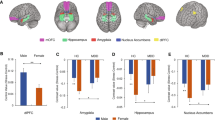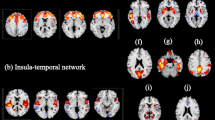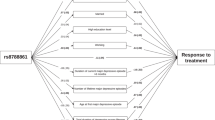Abstract
The hypothalamic–pituitary–adrenal (HPA) axis has been implicated in the pathophysiology of a variety of mood and cognitive disorders. Neuroendocrine studies have demonstrated HPA axis overactivity in major depression, a relationship of HPA axis activity to cognitive performance and a potential role of HPA axis genetic variation in cognition. The present study investigated the simultaneous roles HPA axis activity, clinical symptomatology and HPA genetic variation play in cognitive performance. Patients with major depression with psychotic major depression (PMD) and with nonpsychotic major depression (NPMD) and healthy controls (HC) were studied. All participants underwent a diagnostic interview and psychiatric ratings, a comprehensive neuropsychological battery, overnight hourly blood sampling for cortisol and genetic assessment. Cognitive performance differed as a function of depression subtype. Across all subjects, cognitive performance was negatively correlated with higher cortisol, and PMD patients had higher cortisol than did NPMDs and HCs. Cortisol, clinical symptoms and variation in genes, NR3C1 (glucocorticoid receptor; GR) and NR3C2 (mineralocorticoid receptor; MR) that encode for GRs and MRs, predicted cognitive performance. Beyond the effects of cortisol, demographics and clinical symptoms, NR3C1 variation predicted attention and working memory, whereas NR3C2 polymorphisms predicted memory performance. These findings parallel the distribution of GR and MR in primate brain and their putative roles in specific cognitive tasks. HPA axis genetic variation and activity were important predictors of cognition across the entire sample of depressed subjects and HR. GR and MR genetic variation predicted unique cognitive functions, beyond the influence of cortisol and clinical symptoms. GR genetic variation was implicated in attention and working memory, whereas MR was implicated in verbal memory.
This is a preview of subscription content, access via your institution
Access options
Subscribe to this journal
Receive 12 print issues and online access
$259.00 per year
only $21.58 per issue
Buy this article
- Purchase on Springer Link
- Instant access to full article PDF
Prices may be subject to local taxes which are calculated during checkout
Similar content being viewed by others
References
Patel PD, Lopez JF, Lyons DM, Burke S, Wallace M, Schatzberg AF . Glucocorticoid and mineralocorticoid receptor mRNA expression in squirrel monkey brain. J Psychiatr Res 2000; 34: 383–392.
de Kloet ER, Oitzl MS, Joels M . Stress and cognition: are corticosteroids good or bad guys? Trends Neurosci 1999; 22: 422–426.
de Kloet ER, Reul JM . Feedback action and tonic influence of corticosteroids on brain function: a concept arising from the heterogeneity of brain receptor systems. Psychoneuroendocrinology 1987; 12: 83–105.
Young EA, Lopez JF, Murphy-Weinberg V, Watson SJ, Akil H . Mineralocorticoid receptor function in major depression. Arch Gen Psychiatry 2003; 60: 24–28.
Holsboer F . The corticosteroid receptor hypothesis of depression. Neuropsychopharmacology 2000; 23: 477–501.
Murphy BE . Steroids and depression. J Steroid Biochem Mol Biol 1991; 38: 537–559.
Deuschle M, Gotthardt U, Schweiger U, Weber B, Korner A, Schmider J et al. With aging in humans the activity of the hypothalamus-pituitary-adrenal system increases and its diurnal amplitude flattens. Life Sci 1997; 61: 2239–2246.
Pfohl B, Sherman B, Schlechte J, Stone R . Pituitary-adrenal axis rhythm disturbances in psychiatric depression. Arch Gen Psychiatry 1985; 42: 897–903.
Yehuda R, Teicher MH, Trestman RL, Levengood RA, Siever LJ . Cortisol regulation in posttraumatic stress disorder and major depression: a chronobiological analysis. Biol Psychiatry 1996; 40: 79–88.
Belanoff JK, Kalehzan M, Sund B, Fleming Ficek SK, Schatzberg AF . Cortisol activity and cognitive changes in psychotic major depression. Am J Psychiatry 2001; 158: 1612–1616.
Keller J, Flores B, Gomez RG, Solvason HB, Kenna H, Williams GH et al. Cortisol circadian rhythm alterations in psychotic major depression. Biol Psychiatry 2006; 60: 275–281.
Lembke A, Gomez R, Tenakoon L, Keller J, Cohen G, Williams GH et al. The mineralocorticoid receptor agonist, fludrocortisone, differentially inhibits pituitary-adrenal activity in humans with psychotic major depression. Psychoneuroendocrinology 2013; 38: 115–121.
Nelson JC, Davis JM . DST studies in psychotic depression: a meta-analysis. Am J Psychiatry 1997; 154: 1497–1503.
Grossmann C, Scholz T, Rochel M, Bumke-Vogt C, Oelkers W, Pfeiffer AF et al. Transactivation via the human glucocorticoid and mineralocorticoid receptor by therapeutically used steroids in CV-1 cells: a comparison of their glucocorticoid and mineralocorticoid properties. Eur J Endocrinol 2004; 151: 397–406.
Rock PL, Roiser JP, Riedel WJ, Blackwell AD . Cognitive impairment in depression: a systematic review and meta-analysis. Psychol Med 2014; 44: 2029–2049.
Gomez RG, Fleming SH, Keller J, Flores B, Kenna H, DeBattista C et al. The neuropsychological profile of psychotic major depression and its relation to cortisol. Biol Psychiatry 2006; 60: 472–478.
Lupien SJ, Gillin CJ, Hauger RL . Working memory is more sensitive than declarative memory to the acute effects of corticosteroids: a dose-response study in humans. Behav Neurosci 1999; 113: 420–430.
Joels M, Karst H, DeRijk R, de Kloet ER . The coming out of the brain mineralocorticoid receptor. Trends Neurosci 2008; 31: 1–7.
Rimmele U, Besedovsky L, Lange T, Born J . Blocking mineralocorticoid receptors impairs, blocking glucocorticoid receptors enhances memory retrieval in humans. Neuropsychopharmacology 2013; 38: 884–894.
Otte C, Wingenfeld K, Kuehl LK, Kaczmarczyk M, Richter S, Quante A et al. Mineralorticoid receptor stimulation improves cognitive function and decreases cortisol secretion in depressed patients and healthy individucoals. Neuropsychopharmacology 2014; 40: 386–393.
Otte C, Hinkelmann K, Moritz S, Yassouridis A, Jahn H, Wiedemann K et al. Modulation of the mineralocorticoid receptor as add-on treatment in depression: a randomized, double-blind, placebo-controlled proof-of-concept study. J Psychiatr Res 2010; 44: 339–346.
Medina A, Seasholtz AF, Sharma V, Burke S, Bunney W Jr., Myers RM et al. Glucocorticoid and mineralocorticoid receptor expression in the human hippocampus in major depressive disorder. J Psychiatr Res 2013; 47: 307–314.
Lucassen PJ, Heine VM, Muller MB, van der Beek EM, Wiegant VM, De Kloet ER et al. Stress, depression and hippocampal apoptosis. CNS Neurol Disord Drug Targets 2006; 5: 531–546.
Bortoluzzi A, Salum GA, Blaya C, Silveira PP, Grassi-Oliveira R, Dias da Rosa E et al. Mineralocorticoid receptor genotype moderates the association between physical neglect and serum BDNF. J Psychiatr Res 2014.
Sun J, Song F, Wang J, Han G, Bai Z, Xie B et al. Hidden risk genes with high-order intragenic epistasis in Alzheimer's disease. J Alzheimers Dis 2014; 41: 1039–1056.
Seckl JR, Dickson KL, Yates C, Fink G . Distribution of glucocorticoid and mineralocorticoid receptor messenger RNA expression in human postmortem hippocampus. Brain Res 1991; 561: 332–337.
Gomez-Sanchez EP, Gomez-Sanchez CE . Central regulation of blood pressure by the mineralocorticoid receptor. Mol Cell Endocrinol 2012; 350: 289–298.
Gil-Bea FJ, Aisa B, Solomon A, Solas M, del Carmen Mugueta M, Winblad B et al. HPA axis dysregulation associated to apolipoprotein E4 genotype in Alzheimer's disease. J Alzheimers Dis 2010; 22: 829–838.
van Rossum EF, van den Akker EL . Glucocorticoid resistance. Endocr Dev 2011; 20: 127–136.
El-Hage W, Phillips ML, Radua J, Gohier B, Zelaya FO, Collier DA et al. Genetic modulation of neural response during working memory in healthy individuals: interaction of glucocorticoid receptor and dopaminergic genes. Mol Psychiatry 2013; 18: 174–182.
Young AH, Gallagher P, Watson S, Del-Estal D, Owen BM, Ferrier IN . Improvements in neurocognitive function and mood following adjunctive treatment with mifepristone (RU-486) in bipolar disorder. Neuropsychopharmacology 2004; 29: 1538–1545.
Schatzberg AF, Keller J, Tennakoon L, Lembke A, Williams G, Kraemer FB et al. HPA axis genetic variation, cortisol and psychosis in major depression. Mol Psychiatry 2014; 19: 1151.
Kumsta R, Entringer S, Koper JW, van Rossum EF, Hellhammer DH, Wust S . Sex specific associations between common glucocorticoid receptor gene variants and hypothalamus-pituitary-adrenal axis responses to psychosocial stress. Biol Psychiatry 2007; 62: 863–869.
de Kloet ER, Otte C, Kumsta R, Kok L, Hillegers MH, Hasselmann H et al. STRESS and DEPRESSION a crucial role of the mineralocorticoid receptor. J Neuroendocrinol 2016.
Hamstra DA, de Kloet ER, van Hemert AM, de Rijk RH, Van der Does AJ . Mineralocorticoid receptor haplotype, oral contraceptives and emotional information processing. Neuroscience 2015; 286: 412–422.
Naismith SL, Longley WA, Scott EM, Hickie IB . Disability in major depression related to self-rated and objectively-measured cognitive deficits: a preliminary study. BMC Psychiatry 2007; 7: 32.
Reppermund S, Ising M, Lucae S, Zihl J . Cognitive impairment in unipolar depression is persistent and non-specific: further evidence for the final common pathway disorder hypothesis. Psychol Med 2009; 39: 603–614.
Wang CE, Halvorsen M, Sundet K, Steffensen AL, Holte A, Waterloo K . Verbal memory performance of mildly to moderately depressed outpatient younger adults. J Affect Disord 2006; 92: 283–286.
McClintock SM, Husain MM, Greer TL, Cullum CM . Association between depression severity and neurocognitive function in major depressive disorder: a review and synthesis. Neuropsychology 2010; 24: 9–34.
McDermott LM, Ebmeier KP . A meta-analysis of depression severity and cognitive function. J Affect Disord 2009; 119: 1–8.
Landro NI, Stiles TC, Sletvold H . Neuropsychological function in nonpsychotic unipolar major depression. Neuropsychiatry Neuropsychol Behav Neurol 2001; 14: 233–240.
Murphy FC, Michael A, Robbins TW, Sahakian BJ . Neuropsychological impairment in patients with major depressive disorder: the effects of feedback on task performance. Psychol Med 2003; 33: 455–467.
Fortier ME, Sengupta SM, Grizenko N, Choudhry Z, Thakur G, Joober R . Genetic evidence for the association of the hypothalamic-pituitary-adrenal (HPA) axis with ADHD and methylphenidate treatment response. Neuromolecular Med 2013; 15: 122–132.
Yan YX, Dong J, Zhang J, Liu F, Wang W, Zhang L et al. Polymorphisms in NR3C1 gene associated with risk of metabolic syndrome in a Chinese population. Endocrine 2014; 47: 740–748.
Lasic D, Bevanda M, Bosnjak N, Uglesic B, Glavina T, Franic T . Metabolic syndrome and inflammation markers in patients with schizophrenia and recurrent depressive disorder. Psychiatr Danub 2014; 26: 214–219.
Mezuk B, Eaton WW, Albrecht S, Golden SH . Depression and type 2 diabetes over the lifespan: a meta-analysis. Diabetes Care 2008; 31: 2383–2390.
Pan A, Lucas M, Sun Q, van Dam RM, Franco OH, Manson JE et al. Bidirectional association between depression and type 2 diabetes mellitus in women. Arch Intern Med 2010; 170: 1884–1891.
Vinson GP . Angiotensin II, corticosteroids, type II diabetes and the metabolic syndrome. Med Hypotheses 2007; 68: 1200–1207.
Bruehl H, Rueger M, Dziobek I, Sweat V, Tirsi A, Javier E et al. Hypothalamic-pituitary-adrenal axis dysregulation and memory impairments in type 2 diabetes. J Clin Endocrinol Metab 2007; 92: 2439–2445.
Gold SM, Dziobek I, Sweat V, Tirsi A, Rogers K, Bruehl H et al. Hippocampal damage and memory impairments as possible early brain complications of type 2 diabetes. Diabetologia 2007; 50: 711–719.
Gragnoli C . Hypothesis of the neuroendocrine cortisol pathway gene role in the comorbidity of depression, type 2 diabetes, and metabolic syndrome. Appl Clin Genet 2014; 7: 43–53.
Szczepankiewicz A, Leszczynska-Rodziewicz A, Pawlak J, Rajewska-Rager A, Dmitrzak-Weglarz M, Wilkosc M et al. Glucocorticoid receptor polymorphism is associated with major depression and predominance of depression in the course of bipolar disorder. J Affect Disord 2011; 134: 138–144.
Rovaris DL, Mota NR, de Azeredo LA, Cupertino RB, Bertuzzi GP, Polina ER et al. MR and GR functional SNPs may modulate tobacco smoking susceptibility. J Neural Transm 2013; 120: 1499–1505.
Cellini E, Castellini G, Ricca V, Bagnoli S, Tedde A, Rotella CM et al. Glucocorticoid receptor gene polymorphisms in Italian patients with eating disorders and obesity. Psychiatr Genet 2010; 20: 282–288.
Buckley TM, Schatzberg AF . Aging and the role of the HPA axis and rhythm in sleep and memory-consolidation. Am J Geriatr Psychiatry 2005; 13: 344–352.
Vogel S, Gerritsen L, van Oostrom I, Arias-Vasquez A, Rijpkema M, Joels M et al. Linking genetic variants of the mineralocorticoid receptor and negative memory bias: interaction with prior life adversity. Psychoneuroendocrinology 2014; 40: 181–190.
Liu N, Zhang K, Zhao H . Haplotype-association analysis. Adv Genet 2008; 60: 335–405.
Leszczynska-Rodziewicz A, Szczepankiewicz A, Dmitrzak-Weglarz M, Rajewska-Rager A, Skibinska M, Hauser J . No association between polymorphisms and haplotypes of the AVPR1b, CRHR1 and NR3C1 genes and depression with melancholic features in the course of bipolar disorder. Psychiatry Res 2013; 207: 140–142.
Hardeveld F, Spijker J, Peyrot WJ, de Graaf R, Hendriks SM, Nolen WA et al. Glucocorticoid and mineralocorticoid receptor polymorphisms and recurrence of major depressive disorder. Psychoneuroendocrinology 2015; 55: 154–163.
Acknowledgements
Aspects of this study were supported by grants from the Pritzker Foundation, NIH MH50604 to Alan Schatzberg, NIH MH19938 to Alan Schatzberg, and NIH/NCRR CTSA award number UL1 RR025744. The clinical trial registration number was NCT00576095.
Author information
Authors and Affiliations
Corresponding author
Ethics declarations
Competing interests
Although there is not a conflict of interest, there may appear to be one with Dr Schatzberg. He has a significant interest in Corcept Therapeutics, which licensed the use patent for mifepristone in psychotic major depression. Some of the data presented here were part of a larger study examining the effectiveness of mifepristone in psychotic major depression. No data on mifepristone’s effectiveness are presented in the submitted report. Several authors have been named on a use patent related to the SNPs reported in this manuscript, including Alan Schatzberg, Greer Murphy and Jennifer Keller. Dr Greer Murphy has been a consultant for Brain Resource.
Additional information
Supplementary Information accompanies the paper on the Molecular Psychiatry website
Rights and permissions
About this article
Cite this article
Keller, J., Gomez, R., Williams, G. et al. HPA axis in major depression: cortisol, clinical symptomatology and genetic variation predict cognition. Mol Psychiatry 22, 527–536 (2017). https://doi.org/10.1038/mp.2016.120
Received:
Revised:
Accepted:
Published:
Issue Date:
DOI: https://doi.org/10.1038/mp.2016.120
This article is cited by
-
Body composition, lifestyle, and depression: a prospective study in the UK biobank
BMC Public Health (2024)
-
Major depressive disorder: hypothesis, mechanism, prevention and treatment
Signal Transduction and Targeted Therapy (2024)
-
Inulae Flos has Anti-Depressive Effects by Suppressing Neuroinflammation and Recovering Dysfunction of HPA-axis
Molecular Neurobiology (2024)
-
Neuroinflammation, memory, and depression: new approaches to hippocampal neurogenesis
Journal of Neuroinflammation (2023)
-
Association of remnant cholesterol with depression among US adults
BMC Psychiatry (2023)



